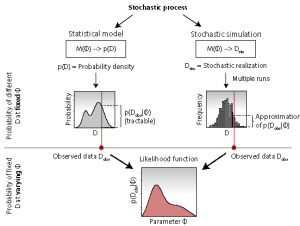
Survival Analysis
The main idea of the course is to develop a critical approach to the analysis of survival data often encountered in health and actuarial sciences research
Course Introduction
Survival Analysis is a branch of statistics focused on analyzing the expected duration of time until an event of interest occurs. This course provides a comprehensive introduction to survival analysis methods commonly used in medical research, clinical trials, and epidemiological studies. Students will learn both theoretical foundations and practical applications using real-world data.
Course Content
Module 1: Introduction to Survival Analysis
- Basic concepts and terminology
- Censoring and truncation
- Survival, hazard, and cumulative hazard functions
- Applications in medical and health research
- Types of survival studies
Module 2: Non-parametric Methods
- Life tables
- Kaplan-Meier estimator
- Nelson-Aalen estimator
- Log-rank test and other comparison tests
- Graphical methods for survival data
Module 3: Semi-parametric Methods
- Cox proportional hazards model
- Model building and variable selection
- Checking proportional hazards assumption
- Time-dependent covariates
- Stratified Cox models
Module 4: Parametric Models
- Exponential, Weibull, and log-logistic models
- Accelerated failure time models
- Model selection and goodness-of-fit
- Frailty models
- Competing risks analysis
Module 5: Advanced Topics
- Recurrent event analysis
- Joint modeling of longitudinal and survival data
- Bayesian approaches to survival analysis
- Machine learning methods for survival prediction
- Current research trends in survival analysis
Assignments
- 1Analysis of a clinical trial dataset using Kaplan-Meier and log-rank tests
- 2Building and interpreting Cox proportional hazards models
- 3Comparison of parametric and semi-parametric approaches
- 4Survival analysis project using real medical data
- 5Critical review of survival analysis methods in published literature
Case Studies
Case Study 1
Cancer survival analysis with multiple treatment arms
Case Study 2
Time-to-event analysis in cardiovascular studies
Case Study 3
Recurrent hospitalization analysis in chronic disease patients
Case Study 4
Competing risks analysis in transplant studies
Case Study 5
Survival prediction models in critical care medicine
Datasets
Veterans' Administration Lung Cancer Trial
Classic dataset for survival analysis demonstrations
Stanford Heart Transplant Data
Survival times of heart transplant patients
SEER Cancer Statistics
Comprehensive cancer incidence and survival data
Framingham Heart Study
Longitudinal data for cardiovascular event analysis
Recommended Textbooks
Survival Analysis: Techniques for Censored and Truncated Data
by John P. Klein and Melvin L. Moeschberger
View Book DetailsApplied Survival Analysis: Regression Modeling of Time-to-Event Data
by David W. Hosmer, Stanley Lemeshow, and Susanne May
View Book DetailsReady to Enroll in this Course?
Gain valuable skills and knowledge in Survival Analysis. Contact us today to learn about enrollment options, schedules, and more.
Contact for Enrollment